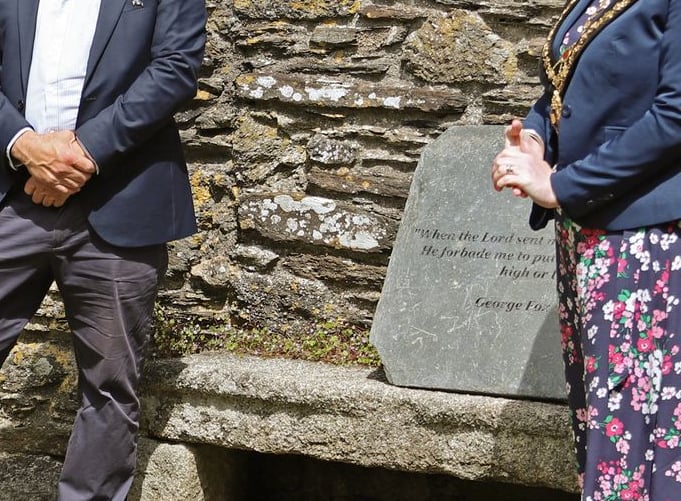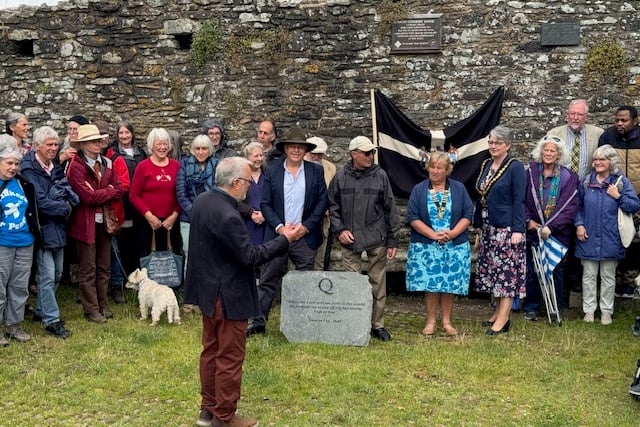TO mark 400 years since the birth of George Fox, a religious radical and one of the founders of the Religious Society of Friends (also often known today as Quakers), a plaque was unveiled in Launceston.
They were truly a radical movement and sparked much controversy and anger among the established church of the day. As they would refuse to pay tythes and at times would disrupt church services in order to get their message across, sometimes this was achieved by pamphlets leading to many arrests, imprisonment and beatings.
At a formative stage of his life, Fox was imprisoned for many weeks in Launceston Castle and to mark the anniversary of his birth, Quakers in Cornwall and Devon organised and held a commemorative gathering at the site of the prison on July 7.

This was an opportunity to remember the life and service of George Fox and the many other early Quakers. Through their witness and commitment they did so much to establish the Religious Society of Friend.
Events have been happening all over the world to remember the remarkable man and the start of the religious movement that was inspired by him and still exists today.
As a part of the gathering in Launceston, Author Barry West presented a slate tablet to the town mayor that told the story about George Fox would refuse to practice hat honour and is a matter of record he was imprisoned in the most terrible of conditions.
On one occasion it was here in Doomsdale, Launceston where he suffered the awful of conditions and treatment.
Fox was arrested multiple times throughout his life and spent much time incarcerated, on one such occasion he was arrested in 1655 by the Lord Protector Oliver Cromwell's forces under suspicion of the Quaker movement's promotion of monarchist plots and suspected aim of overthrowing the government.
He was transported to London to be brought before Cromwell. Fox was arrested again in 1656 after distributing religious pamphlets in Launceston and subsequently held for eight months at Launceston Castle during that year. He dubbed the dungeon he was held in 'Doomsdale' and in his journal described it as a nasty stinking place.
In his own writings, Fox describes his incarceration: “The place was so noisome that it was observed few that went in did ever come out again in health.
“There was no house of office [latrine] in it, and the excrement of the prisoners that from time to time had been put there had not been carried out (as we were told) for many years. So that it was all like mire, and in some places to the tops of the shoes in water and urine.
“At night some friendly people of the town brought us a candle and a little straw, and we burned a little of our straw to take away the stink. The thieves lay over our heads, and the head jailer in a room by them.
“It seems the smoke went up into the room where the jailer lay; which put him into such a rage that he took the pots of excrement from the thieves and poured them through a hole upon our heads in Doomsdale, till we were so bespattered that we could not touch ourselves nor one another."
Today the Quaker movement is still an important symbol of peace and harmony in the world as they continue the work for peace, social justice and an equal society, something that I believe stems from the very early values of George Fox himself who believed all men were equal and as far back as then in the 1600s.

The notion that ‘God in every man’ applies equally to women is something that arises from the earliest days of the Quaker movement. As early as 1646, he wrote in his journal: “I came upon a sort of people who held that women have no souls, adding in a light manner, ‘no more than a goose.’ But I reproved them, and told them that was not right; for Mary said, ‘my soul doth magnify the Lord.’”
One another occasion George challenged a priest who would not permit a woman to speak in a church, so it is clear that he was a man before his time.
For people that want to learn more about the coming of the Quakers and George Fox in Cornwall, Barry is launching a new book entitled - George Fox, Loveday Hambly and Friends.
The book contains important historical information and describes how the movement emerged in times of turmoil. In doing so, it attempts to connect the past to the present so that this important story and its relevance to our modern world is not forgotten.
In this book, Barry recounts the life and times of a Cornish woman whose story, important in both local and national terms, has been forgotten.





Comments
This article has no comments yet. Be the first to leave a comment.